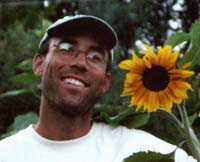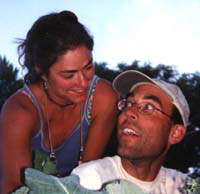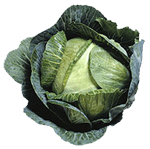Dev Carey is a tall, handsome man with a Ph.D. in ecology. He can swing dance like a pro, identify every plant in the meadow outside his house, and talk nervous youths into rappelling off cliffs. He can do many things, but one thing he can’t do is separate himself from the morality of any given situation. Especially the environmental morality of any given situation.

Dev Carey, flower child.
Photo: Lisa Jones.
This is something of a curse. Like Cassandra in Greek mythology, he stares unblinking at the writing on the wall, while the rest of us chatter and sigh and get into handbaskets clearly marked “Hell.” And oh, he suffers.
A few years ago, he and I dated for awhile. We’d be driving home after a perfectly nice afternoon of kayaking. He’d look at the gas gauge and then downward, his shoulders stiffening. He’d look out at the condos being built by the highway and close his eyes.
After a while, this ceased to be much fun. I felt guilty. He felt terrible that he was making me — and other friends — feel guilty.
“I felt trapped,” he says, “like I was at a party and was the only one hearing a child crying out for help, but that if I pointed it out, all those partying people would get mad at me for being a downer. So I just stood there, paralyzed. I needed a way to make my own peace without needing others to do so.”
Family Values
Moral fortitude runs in Dev’s family. He is descended from a long line of Presbyterian ministers. He and his father once took a kayaking trip on the Klamath River in Oregon that started at the mouth of the river and proceeded toward its headwaters. They paddled for a month. Upstream. Yes, they did.
Dev’s ingrained Presbyterian drive is amplified by a brain that functions perhaps a little too well. His academic career, from kindergarten through his Ph.D, was marked by honors, grants, scholarships, downright pleas that he keep hitting the books.
But the miracle about Dev is that while these elevated moral and mental capacities are what cause his suffering, they are also what can alleviate it. He thinks things through. He has trouble doing the wrong thing, but he has figured out ways of doing the right thing that don’t make his companions want to kill themselves, or him.
He is pained by the consequences of cars, so he doesn’t own one. He bikes or hitchhikes instead, or hops a ride with his wife, Merrylea, who drives a rehabbed Volvo painted to resemble a huge carton of Ben & Jerry’s.

Dev and Merrylea.
Photo: Lisa Jones.
He is also pained by modern construction material and excess, so he and Merrylea are building a house out of entirely recycled materials. I’m not talking 20 percent post-consumer-waste drywall from a groovy-looking catalog with jaw-dropping prices. I’m talking retaining walls made of old refrigerators and stucco. I’m talking windows from garage sales and beams that once held up derelict barns.
A few years ago, he decided to aim for a diet of only local, organic food. When it came to meat, he favored the ultimate in local cuisine — roadkill. He and Merrylea once arrived at a potluck with a dying deer in the back of their Volvo. It is a testament to the spirit of their hosts that the whole party went and butchered the deer before dinner.
Dev is absolutely the least consumptive person I know. Even among the earthy, vegetable-growing, Gaia-worshipping, bartering folk of his hometown of Paonia, Colo., he is a paragon of conservation.
But he became exhausted by his own standards. “I was tired of being hard on the world, and myself, and other people,” he said.
The Cabbage Manifesto
Then, this summer — after thinking good and hard about cabbage that is grown in Mexico, heavily doused with pesticides, picked by underpaid workers, and driven in refrigerated trucks all around North America — he hit upon a solution. He decided to tax himself on what he consumes. A locally grown vegetarian meal requires no taxation. But a breakfast burrito — made with local eggs, but imported tomatoes, cheese, onions, and tortilla — will require a couple dollars to be donated to an environmental organization. It’s all in his recently penned “Cabbage Manifesto,” excerpted here:
Every time a dollar leaves my pocket, I classify it by two criteria: what is the environmental ethic of what I purchased and how far did it have to travel. The cabbage from Mexico is nonlocal and non-responsible; it scores a minus/minus. The local, organic cabbage gets a plus/plus, while an organic cabbage from California gets a plus/minus. In the same way, Ben & Jerry’s gets a plus/minus, Reebok shoes get a minus/minus. A massage from a local gets a plus/plus. Of course, there are complications to all this. That local, organic cabbage might come in a plastic sack. That local restaurant buys food at Sam’s Club. But I just take my best guess. In the end, I figure, it will all average out. For every minus/minus dollar spent, I contribute another dollar to a worthy nonprofit. For every plus/minus, I contribute 50 cents. For a plus/plus, I pay no taxes.
I also tax my earnings by the same criteria, although at half the rate. For every two dollars I earn selling Coors Beer, for example, I will contribute one to a nonprofit. Two dollars for my local teaching efforts I keep to myself. If I work for the locally owned deli that sells some nonlocal cheese and meat but local greens (a plus/minus overall in my book), I contribute 50 cents of that two dollars.
It’s all guesswork, of course. Who knows if a dollar to the Nature Conservancy will make up for a dollar to Nike. But it feels like it’s possible. If everyone were to start this system, the world would change drastically.
The most exciting thing is that the system is working. I am balancing my budget, even saving. Already I feel lighter. There is no need to torture myself with guilt after each bad purchase in an effort to find the courage to do better on the next one. I just buy, and if I run out of money, I run out. I can deal with that. I follow my inclinations and search for the best deal, the most bang for the buck like any other consumer. Those local, organic cabbages now make sense, and so, sometimes, does a hammer from Wal-Mart. I like that this tax system is easy to explain to other people, and that anybody could begin the method any time. I like the fact that I can just do it quietly without moralizing.
I am also having fun contributing to worthy causes. I have realized that with all these donations to nonprofits and the subsequent write-offs, I will owe no taxes come April 15. It’s an uplifting thought. I have control over how my money is used.
When I buy cabbage from Mexico, I still think about it. I see the images of overworked fields and locals made sick by pesticides. The difference is that it’s easier now to feel thanks instead of guilt, and I know my life is part of the solution. It’s time to delight in some coleslaw.


